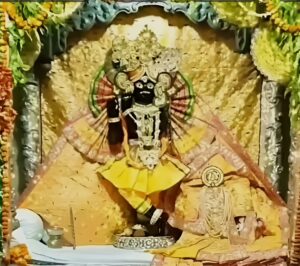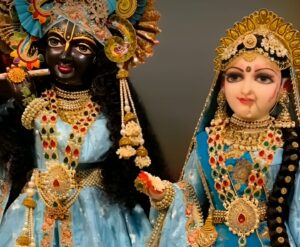
In a significant hearing on Monday, the Supreme Court invoked the spirit of Lord Krishna—the “first mediator”—while hearing a dispute concerning the Shri Banke Bihari(Lord Krishna) Temple in Vrindavan and a controversial ordinance passed by the Uttar Pradesh government. The ordinance aims to redevelop a temple corridor using ₹500 crore from temple funds, sparking fierce opposition from the temple trust.
The apex court proposed a conciliatory approach, urging the parties to mediate. “Lord Krishna was the first mediator… Please try to mediate the matter,” the bench led by Justice Surya Kant and Justice Joymalya Bagchi remarked, recommending the formation of a committee to resolve the issue between the UP government and the temple trust.
The Supreme Court made it clear, however, that the constitutional validity of the UP government’s ordinance must first be examined by the Allahabad High Court. The court expressed concern over the urgency and secrecy in which the ordinance was passed and implemented.
“What was the hurry in pushing this through?” the court asked, showing clear disapproval of what it described as the “clandestine manner” in which the government had obtained the Supreme Court’s earlier nod to use the temple’s funds.
Proposal to Suspend Earlier Supreme Court Order
The court signaled its intention to reconsider a previous judgment dated May 15, in which it had permitted the UP government to use the temple’s money for redevelopment. “We propose to keep that part of the judgement in abeyance,” the bench said.
The judges proposed appointing a former High Court judge or a retired district judge as the head of an interim management committee. This committee would temporarily oversee the functioning of the temple, as well as the usage of funds, while the ordinance’s legality is under judicial review.
The committee would also be empowered to use a portion of the funds for infrastructural improvements to enhance pilgrimage safety and experiences.
Temple Trust to Challenge Ordinance
The Supreme Court emphasized that the Lord Krishna temple trust should be given an opportunity to contest the UP government’s ordinance, including seeking legal restraint on the state’s interference in religious rituals and temple management.

Additional Solicitor General KM Nataraj, appearing for the state government, was directed to confer with UP officials and report back to the court by 10:30 AM on Tuesday regarding the court’s proposals.
The former management of the temple argued during the hearing that the ordinance had displaced a family that had overseen Lord Krishna temple administration for generations. They also claimed that the ordinance was implemented without their prior consultation or a proper hearing.
The court was informed that the UP government had inserted itself into what was essentially a private dispute and had secured the May 15 Supreme Court order to access temple funds. The bench sharply questioned this sequence of events, asking how such an order could still stand when it appeared that no formal notice had been issued regarding the Banke Bihari (Lord Krishna )Temple specifically.

Justice Surya Kant rebuked the state’s approach, stating, “This was not a case of ‘no man’s land’ where nobody could represent the Lord Krishna temple. Someone had to be heard on its behalf.”
The bench also questioned why the government had not followed due legal procedure if it wished to redevelop the corridor for public interest. “Why didn’t the state acquire the land by paying compensation? If it wanted to undertake development, it should have done so as per law,” the court said.
Prior Supreme Court Rebuke in May
This isn’t the first time the UP government’s involvement in the temple affairs has drawn judicial criticism. In May, another Supreme Court bench, comprising Justices BV Nagarathna and Satish Chandra Sharma, warned that allowing the state to intervene in disputes between private parties could result in “a breakdown of the rule of law.”
“Was the state a party to the proceedings? In what capacity did it enter the dispute?” the bench had asked at the time. “If states start interfering in private litigation, it is not permissible.”
The UP government had defended its move by citing the formation of a trust to manage the temple and oversee the redevelopment plan. However, the court remained unconvinced about the legality and appropriateness of such a move without due process.
Background: Banke Bihari (Lord Krishna)Temple and Safety Concerns
The Banke Bihari (Lord Krishna ) Temple, built in 1862, is one of the most revered pilgrimage sites in North India. It is traditionally managed by a group of Shebaits, a hereditary priesthood responsible for the temple’s rituals and daily operations.
The demand for redevelopment arose after a tragic incident during Janmashtami celebrations in 2022, when a stampede-like situation led to the deaths of two devotees. To manage increasing crowds and ensure safety, the Allahabad High Court, in September 2023, directed the UP government to come up with a plan for a temple corridor to ease pressure during peak pilgrimage seasons.
ALSO READ-Niladri Bije The Grand Wellcome Of Lord Jagannath With Brother and Sister
While the state’s intentions may have been guided by public safety concerns, the execution—particularly the use of temple funds and the sidelining of hereditary temple authorities—has raised serious legal and ethical questions.
The Supreme Court’s suggestion to form a neutral interim committee, possibly chaired by a retired judge, could help strike a temporary balance until the legality of the ordinance is resolved. Meanwhile, the Allahabad High Court will play a crucial role in determining whether the UP government overstepped its constitutional limits in issuing the ordinance and redirecting Lord Krishna temple funds for public infrastructure projects.
The case has now become a landmark in the ongoing debate over state control of religious institutions, raising larger questions about governance, heritage, faith, and the rule of law in modern India.
